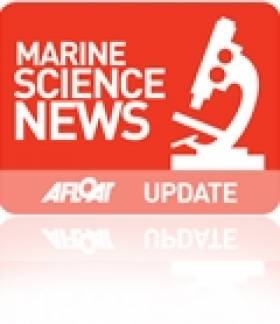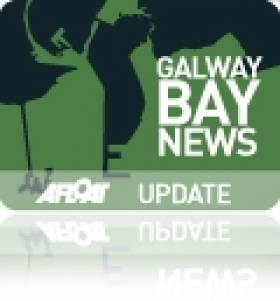Displaying items by tag: missing
Search Resumes For Fisherman Washed Off Clare Rocks
#Missing - RTÉ News reports that a search and rescue effort resumes this morning for a fisherman missing off Co Clare after he was washed into the sea yesterday evening (6 October).
The Latvian national was angling with friends off rocks near Fanore when he was knocked off balance by an unexpected wave. One friend jumped into the sea to attempt rescue but was unsuccessful, and was himself later treated for hypothermia.
A search of the shoreline was set to resume this morning as weather and sea conditions remain difficult, with a small craft warning in effect around the coast as winds are expected to reach Force 6 or higher.
Family Of Missing Angler Arrive In Northern Ireland As Search Continues
#Missing - The search continues on the North Antrim coast for a missing man thought to have been swept out to sea while angling at the weekend.
The man has been named as 38-year-old Polish national Jaroslaw Andrykiewicz, who had been living in Northern Ireland for six years and worked at a vegetable produce firm in Co Armagh.
BBC News reports that the family of the missing man have arrived in Northern Ireland as search and rescue services continue to comb the coast around Ramore Head in Portrush, where he was last seen.
The search for Andrykiewicz had been slowed earlier this week by the stormy conditions in the region.
Storm Slows Search For Missing Portrush Sea Angler
#Missing - The Irish Times reports that the search for a sea angler missing off the North Antrim coast has been postponed due to today's dangerously high winds.
The PSNI has also urged members of the public wishing to help with the search for the 38-year-old - who is believed to have been swept into the sea while fishing on rocks at Ramore Head yesterday - to step back and leave the search to the professionals.
“Deteriorating weather and sea conditions mean that the search environment is extremely challenging and police do not want to see anyone put at risk," said a spokesperson.
Missing Howth Fisherman Not Found After Search Resumes
#Missing - RTÉ News reports that the search resumed this morning (7 September) for a man reported missing in Howth yesterday evening.
Search and rescue services sprang into action after reports that a man was spotted in the water near the Baily Lighthouse.
It later emerged that the missing man is in his 40s, and fishing gear believed to belong to him was found in the area where he was last seen.
The search was suspended last night around 8pm due to fading light and resumed this morning, but the surface search has now concluded with no sign of the missing man.
Garda divers are assessing conditions for a possible underwater search later today.
Appeal For Missing Young Scientists Probe in Dundalk Bay
#MarineScience - A team of young scientists have lost a special weather balloon probe somewhere in Dundalk Bay - and they've turned to the internet for help.
CoderDojo mentor Daniel O'Reilly, who has been working with the teens on their project for a national science competition, has appealed on Twitter for assistance, posting an image of the missing item and its last known location.
The silver duct-taped box is marked as 'Infinity-1' and was launched from Armagh on a weather balloon last Thursday 22 August.
The probe parachuted from 30km into Dundalk Bay and has not been seen since. It's last known whereabouts were at co-ordinates 53.09795, -6.29013.
If anyone finds the box, either in full in part, on the shoreline or in the bay, they are urged to contact O'Reilly at +44 (0) 770 890 5697 or 087 689 0785, or email [email protected]
#News - UTV News reports that a body recovered from the River Foyle on Thursday 9 May is that of missing Dublin teenager Kieran McKeon.
The 18-year-old was reported missing two months ago along with a friend, 21-year-old Alexandra O'Brien, whose body was found in the water close to Foyle Bridge in Derry on 14 March, as previously reported on Afloat.ie.
It's thought that the two took their own lives in a suicide pact, after eyewitness reports described two people falling into the river from the bridge.
Personal items said to belong to O'Brien and McKeon were found on the bridge which sparked off the search operation led by Foyle Search and Rescue, which had continued every evening since at low tide, with a full search once a week.
UTV News has more on the story HERE.
Body Found In Search For Missing Dalkey Island Swimmer
#MissingSwimmer - RTÉ News is reporting that a swimmer taken from the water after going missing off Dalkey Island in Dublin Bay this morning (Sunday 7 April) has died.
Earlier this evening The Irish Times reported that the 35-year-old man was in a critical condition in Tallaght Hospital after being recovered from the water off Sorrento Terrace.
Lifeboat volunteers with Dun Laoghaire RNLI and the Irish Coast Guard's Dublin-based helicopter Rescue 116 were involved in the search which began around 11am today after the swimmer failed to return to shore.
#News - The body of a Meath teenager who went missing in the early hours of Easter Monday has been found in the River Blackwater, as the Irish Independent reports.
Ricky McDermott, 17, disappeared after a night out in Virginia, Co Cavan on Sunday night.
Following a search launched on Monday morning, The Irish Times reports that a body was recovered from the River Blackwater in Virginia around 5pm yesterday (2 April) by the Boyne Fishermen’s Rescue and Recovery service.
In other news, the man pulled from the water near Portstewart Harbour yesterday has died.
BBC News reports has named the deceased as Stanley Duncan, who was chief executive of the Driver and Vehicle Agency in Northern Ireland.
It's understood that the 57-year-old has been fishing at rocks near the harbour when he fell into the sea by Victoria Terrace.
Search For Galway Man Extends To Coastal Areas
#GalwayBay - Galway Bay FM reports that the search for a missing Galway man has been expanded to a coastal search.
Tom Ward, 39, was last seen in Galway city centre on 7 February, and was reported missing by his family 10 days later.
Gardaí stepped up their search to the shoreline areas of Galway Bay adjoining the city earlier this week, enlisting Civil Defence volunteers to search as far as Kinvara in the south-east corner of the bay.
Body Recovered From Irish Sea Could Be Missing Rush Man
#Missing - A body recovered from the sea off north Co Dublin yesterday may be that of a man who went missing from Rush at Christmas.
The Irish Independent reports that a post-mortem is being carried out on the body to confirm if it is that of 24-year-old Paul Byrne, who was last seen in the early hours of Christmas Day.
Fishermen in the Irish Sea made the grim discovery in their nets yesterday and brought the body to Skerries harbour after 8pm.
The Irish Independent has more on the story HERE.






































































